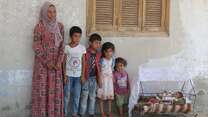Increased and better funding for humanitarian aid as a stepping stone to development is not in itself sufficient to address today’s compounding crises. The EU must also raise the bar in its efforts to protect the humanitarian and civilian space as a precursor for reaching populations in need. With conflict remaining the primary driver of humanitarian need in far too many places, (see IRC’s Emergency Watchlist 2024), wars are increasingly fought with disregard for international law - with civilians bearing the brunt. While International Humanitarian Law (IHL) obliges warring parties to take steps to mitigate the impacts of war on civilians, we have instead entered an Age of Impunity, with devastating impacts on the communities IRC serves around the world.
Moreover, parties to conflicts are increasingly weaponising critical aid, blocking it from reaching certain populations. Nearly 40 countries are currently experiencing high constraints on humanitarian access. In order to tackle IHL violations, the world does not need new rules or laws, but a re-invigorated commitment to implement existing ones. If it hopes to reduce the impacts of conflict on civilians, the EU should redouble its efforts through political dialogue and the promotion of IHL in the following ways:
The EU should utilise its strong and independent voice to press for access and respect for IHL more broadly. This includes engaging with states and, where possible, working on the ground with non-state actors. The EU has previously provided leadership on this front, and is well-positioned to place access at the heart of its diplomacy efforts once again by doing the following:
- Invest in efforts to improve data collection on humanitarian access to support collective EU action, recording cases where access is denied. This work should provide the evidence needed for coordinated private EU and bilateral Member State diplomacy and, where appropriate, public condemnation of access denial.
- Ensure continued quiet diplomacy. DG ECHO’s presence often adds great value to discussions at field level - and for many IRC teams, its ongoing quiet diplomacy has been central to successful efforts to overcome access barriers - but presence does not always translate into political influence. Establishing dedicated deployable EU access expertise at senior level that could support diplomatic engagement when access is denied would not only build capacity, but also demonstrate the importance the EU places on addressing this trend.
- Enhance efforts to elevate the importance of IHL in EU partnerships. While promoting IHL is a core objective of the EU’s external action, more can be done to elevate its importance in EU partnerships. Building commitments to protect humanitarian space into partnerships could play a positive role in ensuring aid reaches those that need it most.
- The EEAS should declare humanitarian access to be a priority issue and consistently reiterate this in key EU humanitarian diplomacy efforts. In particular, the EU should champion the role of regional organisations. Commitments in the EU/AU Joint Vision for 2030 to promote compliance with International Humanitarian Law are an important starting point. The EU should now invest further in this partnership to support regional organisations to assume their responsibilities towards the promotion and protection of access.
- The EU should utilise its independent voice to support the exploration of initiatives for improved access. In a multipolar world, the diplomatic response to access denial cannot be limited to the UN. Existing reporting mechanisms, including the Protection of Civilians and Children and Armed Conflict reports, fail to shed adequate light on the trends and impact of access denial. In response to this reality, the EU should utilise its voice to support initiatives such as a non-profit Independent Access Organisation (IAO) proposed by the IRC, to advance calls for improved access.
The UN Security Council (UNSC) is often left paralysed to act due to political divisions. Countries and territories regularly in the Top 20 of the IRC’s Emergency Watchlist (such as oPt, Afghanistan, Syria and Yemen) are frequently discussed by the Security Council, but action to support civilian protection or monitoring of atrocities remains severely limited. The five permanent Security Council members’ use, or threat, of the veto too often leave war crimes unpunished, and mass atrocities unaddressed. To this end:
- EU leaders should support the France-Mexico declaration to suspend the use of the veto in the case of mass atrocities. This proposal is a tool for Security Council reform with significant buy-in from UN member states: at least 104 UN member states and two UN observer missions have signed the declaration, including Brazil, France, Germany, Mexico, New Zealand, Spain, Türkiye, and Ukraine.
- Support the articulation of what constitutes mass atrocity by an independent panel. To limit political divisions from further polarising action, the determination of what constitutes a mass atrocity (and thus a suspension of the veto) should be made through an independent and neutral panel, as established by the UN General Assembly. The veto suspension proposal could drive a renewal in Security Council legitimacy at a time when the role of the Permanent 5 is regularly questioned
This can be achieved by taking the following steps:
- The EU and its Member States should provide financial support and training to civil society groups, and NGO coordination bodies, to analyse access barriers, and engage in access negotiations. This will not only strengthen the overall capacity of humanitarian sector, but also ensure NGOs have the expertise to complement negotiations led by the UN. Practically, this could be achieved by establishing an NGO co-lead role on access work alongside OCHA at country level.
- The EU and its Member States should simultaneously commit to consulting and, where appropriate, actively engaging with a diverse cross-section of civil society voices in access diplomacy. As we strive for greater local leadership of responses in contexts like Ukraine, these steps will prove critical.


